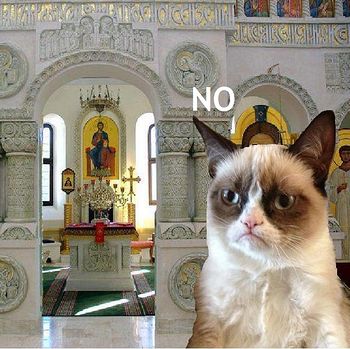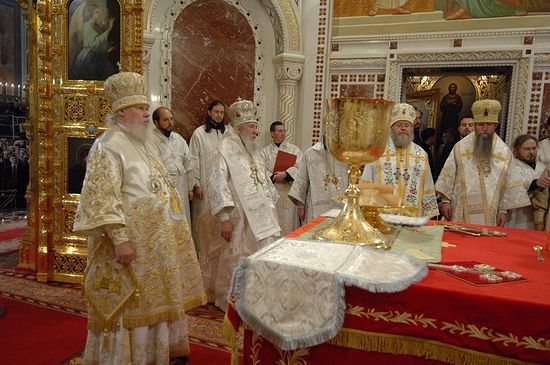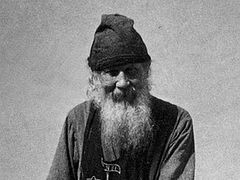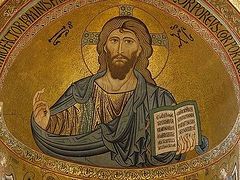Source: Patheos
There is perhaps nothing which is more painful, and obnoxious, than someone believing that they understand why you believe something that you do. For anyone who believes anything, this is an understandable problem. If you believe in God (or god, or spirits, or even just an afterlife) you’re used to the annoying commentary from the proverbial peanut-gallery remarking on how foolish your fear and superstition is. However, it doesn’t just stop there. Even someone who simply believes that they and those around them really exist is open to the irritating voice from the crowd proclaiming their foolish fear of the reality of the nothing which sits beyond their happy fiction of reality.
This has been my experience with a great many people, Catholics especially, who think that they have nailed down the pesky reason why I became Orthodox. Most irritating in all of this is that not only do many of them believe that they’ve pinned down everything about me, but that they always try to voice an odd sort of sympathy. “I understand, I feel that way too.” This is almost always followed by a question, which is of almost singular annoyance to me: “Why didn’t you just become Byzantine though?”
To which I can only respond:
1: Nice Looking Liturgies
Being perhaps the most annoying, for me personally, I thought I’d begin with the impression that an infinite inward passion can be limited to the aesthetically appealing externals of a well celebrated liturgy. It would seem that some, whenever they consider anyone becoming Orthodox the only reason they can muster is that they have “beautiful liturgies.” And to be fair, we do.
However, to say that anyone becomes an Orthodox Christian simply because of the aesthetic experience of the liturgies is missing something integral to Christianity. This idea that “it’s because of the beauty” shows a rather depressing externalism, that is, a reliance upon the aesthetic experience of external actions. This being said, beautiful liturgies are a part of Orthodox worship, but not for the sake of pretty things, but because when something is important you make it visibly special. The beauty of the liturgy has been preserved not for the reason that a work of art is preserved, because it’s something beautiful that should be experienced, but because it is the only response one can muster to the internal and deeply personal meaning of the teachings of the Faith. It is not the gold in the Church, but the reason one wishes there to be that makes the difference.
2: Little “t” traditions
Very similar to this is the response, “I understand, they have such beautiful traditions.” Seeing as how the big “T” Traditions of the East are often at odds with those of the Roman Church, I’m going to go out on a limb and assume that whenever someone uses this phrase they are referring to the little “t” traditions of the cultures associated with Orthodoxy (unless you were referring to big “T” Traditions and were trying to subtly ask my help in navigating your way through the often confusing Orthodox ecclesial structure, in which case I’m a total jack-ass, please forgive me).
While it’s true that wherever Orthodoxy goes a bountiful wealth of cultural traditions follows, that’s a foolish reason to become Orthodox. When someone becomes Orthodox, they do not suddenly become Russian, or Serbian, or Greek etc, they are still who they are, just trying to be a grow in the love of God an neighbor through the teachings of Christ, in a particular way. Certainly many of the traditions of the old and well-formed Orthodox cultures are worth adopting and adapting, especially for our culturally desolate modern consumerist society.
However, it’s still foolish, not to mention disrespectful, to reduce the infinite inward passion of religion to mere externals. It’s the truth and beauty of the beliefs which gave rise to these practices which are important. It doesn’t matter how tall and tasty your kulich is or how you speak church Slavonic, if you aren’t honestly, and with all your heart, working out your salvation in the truth of the Orthodox Church, you’re doing it wrong. This external type of thinking is unfortunate, and paradigmatic of our “cultured” society.
3: Hipsterdom
Many people who think of someone becoming Orthodox immediately think of an ironic hipster. They can’t get past the image of a fixie-bike riding, cigarette smoking, Portland State graduate, who decided to convert to Orthodoxy with his entire apartment building (or tribe). The phrase, “I’m an Orthodox Christian, you’ve probably never heard of it,” comes to mind. Isn’t it so ironic, and against the expectations of our society to be a Christian, and not only a Christian, an Orthodox Christian, something foreign and relatively “underground” in America?
All fine and good, at first, is this hipsterdom, but what comes when it quits being clever? There is nothing gained, by way of grace and spiritual insight, from the bitter solipsism that comes with this ironic Christianity. Eventually, it may even take til death, but at least in death, the good feeling had by the witty blogger, making a quick mockery in eloquent rhetoric of those foolish enough not to “know what I know,” will dissipate into the vast nothingness of this world, “which is already passing away.” When this happens, and it will happen to all of us, these feelings will be nothing but a condemnation. For at death the Lord will ask us quite simply, “Did you love?” (or in Kierkegaard’s words, “Did you live in despair?”).
4: Avoiding Drama
Another common assumption as to why one would decide to become an Orthodox Christian, is that one is running from the drama of the community you belonged to prior to becoming Orthodox. If this is why you are becoming Orthodox, don’t do it, trust me, it will be much the same as the drama you left behind. Wherever there are people there is sin, wherever there is sin there is drama. This much is unavoidable.
This is not at all why I became an Orthodox Christian. Replace Latin with Church Slavonic, and you have many of the same arguments in the Orthodox Church that you do in the Roman Church. In conclusion, it should go without saying that I did not become Orthodox for the sake of any external, be it a present tradition lacking in the West, or the absence of the politics and drama of the West, and no one should convert for this reason, because if they do they will end up invariably disappointed. I became Orthodox for love of the truth of the God-Man, Jesus Christ, His Paschal Mystery, and the salvation found in Him.
Ryan Adams









God Bless you.
Aesthetics can be a powerful draw and the preservation of glorious aesthetics and traditional morality are a powerful witness that the Truth is clothed in Orthodox given the aesthetic and moral exploits of other communities. That is, the fruits of Orthodoxy are as beautiful as the truth of its faith. That is why it is called "Right Glory".